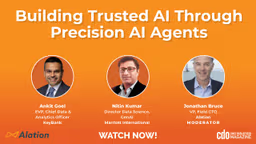Industry Newsroom
Voya Financial, SVP, Head of Data: Digital Transformation Enables Failing Fast
Written by: CDO Magazine Bureau
Updated 10:06 AM UTC, Tue April 29, 2025


Julia Bardmesser.jpg
Julia Bardmesser, SVP, Head of Data, Architecture, and Salesforce Development at Voya Financial, speaks with Peter Ku, VP and Chief Industry Strategist at Informatica, about the future of the organization’s digital transformation, benefits of AI and ML in the financial services industry, and the importance of the ethical use of data.
Regarding Voya’s digital transformation, Bardmesser states that the mission of Voya as a financial services company is to meet the consumers — individuals or companies — where they are in their journey and provide the best possible financial decisions to improve their future financial picture and wellness.
She highlights the importance of data if organizations want to meet customers where they are or need to know where they are. She emphasizes collecting information about where consumers are in their life journeys, and if anything good or bad has happened to them that has financial implications. This information includes a lot of data, and the need is to manage this data ethically, she points out.
Bardmesser emphasizes understanding how customers interact with products to get an idea of what works and what does not. She says that “failing fast” is one of the advantages of the cloud, and digital transformation enables that. To make the most out of it, the company needs to get the optimum amount of data from customer interactions and bring the best products and services to them.
"Ethics and privacy are the backdrops to this,” she adds. “I don’t want to underplay that in any way, shape, or form. But taking this into account, you need the asset, the source, the data, from interaction with the customers plus all the external third-party data that they can bring in." She visualizes the future of digital transformation at Voya from a data analytics perspective and focuses on the best strategic decision making to fulfill the company’s mission.
"That’s why working at Voya for me is so exciting, because data analytics is the cornerstone of our business strategy across all of our business areas,"she says.
Highlighting where artificial intelligence and machine learning stand within the financial services industry, Bardmesser recalls the early days when the conversation revolved around secure and predictive interest rate modeling and payment modeling. However, she says, techniques have changed and there is much more ability now concerning the amount of accessible data and computing power. Although the technology is not brand new, she says, the companies now have the ability to use them to solve problems at a large scale, across platforms.
In terms of data usage, Bardmersser states that there is a massive requirement for both ML and AI. She explains how AI helps with the understanding of nonstructured data by transforming the non-structured information into a structured format. While it is difficult to carry out decision making based on nonstructured data, AI makes it easier. Once the data is structured well, companies need to incorporate a predictive analytics strategy for decision-making, she advises.
From a data governance perspective, she adds, machine learning and AI provide great opportunities for data-driven companies that face challenges while accumulating data from various sources and then use that information to enhance decision making. AI and ML help companies connect multiple sets of data from various sources with no common identifiers.
Bardmesser then moves on to discuss ethics and the importance of ethical use of data in the present business scenario. She addresses the issue of ethics using the product advertisement analogy, "Now that we know you’re pregnant, you might want to buy some diapers." She believes that people are needed to make the usage of data ethical. Although AI and ML can collect all the information and data about the consumer, a machine cannot make judgment calls regarding ethics.
She emphasizes the notion of privacy — the fact that there is information that people want to keep protected. Hence, companies should know what they are using the data for, remain cognizant of the intent behind the usage, and ensure that each customer’s needs are truly fulfilled through the data used.
Bardmesser concludes by stating that data cannot be used just for up-selling. There is a judgment call that machine learning or AI cannot make. Take for example, the conversation around the programming of self-driving cars — it’s been proven that humans do need to make some ethical decisions while driving decision making that a machine is incapable of.





